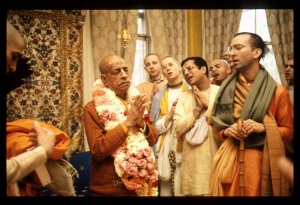CC Antya 1.144 (1975)

A.C. Bhaktivedanta Swami Prabhupada
Below is the 1996 edition text, ready to be substituted with the 1975 one using the compile form.
TEXT 144
- dhari-a paḍicchanda-guṇaṁ
- sundara maha mandire tumaṁ vasasi
- taha taha rundhasi bali-aṁ
- jaha jaha ca-idā palāemhi
SYNONYMS
dhari-a—capturing; paḍicchanda-guṇam—the quality of an artistic picture; sundara—O most beautiful one; maha—My; mandire—within the heart; tumam—You; vasasi—reside; taha taha—that much; rundhasi—You block; bali-am—by force; jaha jaha—as much as; ca-idā—being disturbed; palāemhi—I try to escape.
TRANSLATION
“‘“O dearly beautiful one, the artistic loveliness of Your picture is now impressed within My mind. Since You are now living within My mind, wherever I wish to run because I am agitated by impressions of You, I find that You, O My friend, are blocking My way.”’
PURPORT
This verse (Vidagdha-mādhava 2.33) is written in the Prakrit language, not in Sanskrit. When transformed into Sanskrit, it reads as follows:
- dhṛtvā praticchanda-guṇaṁ sundara mama mandire tvaṁ vasasi
- tathā tathā ruṇatsi balitaṁ yathā yathā cakitā palāye
The meaning is the same, but the native language is different. It was spoken to Kṛṣṇa by Madhumaṅgala as he read Him a letter from Śrīmatī Rādhārāṇī.